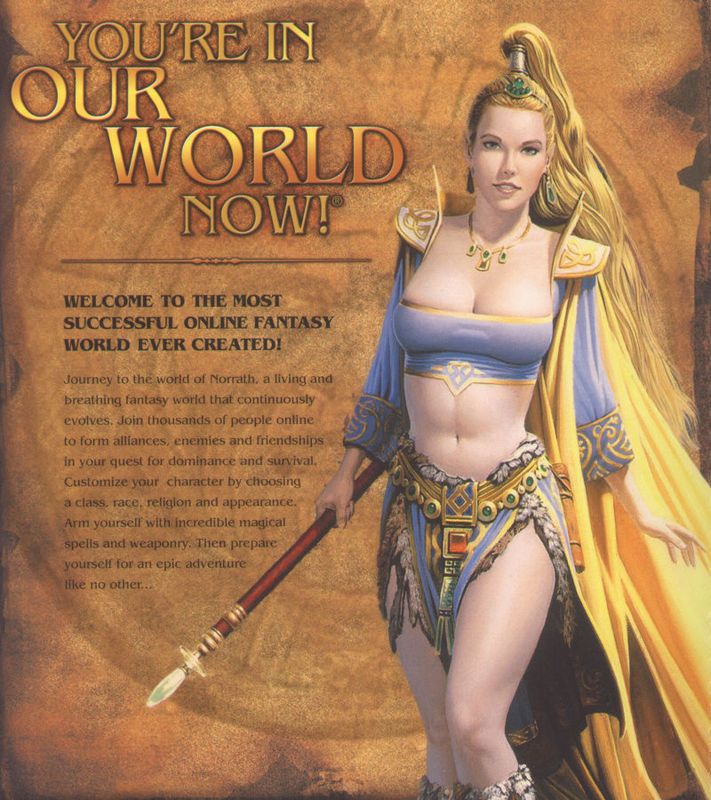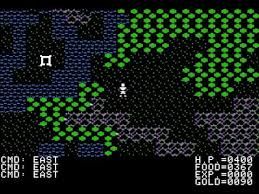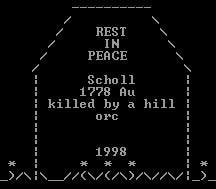Guest Post by Dave Hoffman: From the Tabletop to the Internet – MMORPG’s Past, Present and Future
Monday , 30, May 2016 Computer Games 6 Comments We play board games, especially D&D and its variants, for the feel of adventure with our friends. Whether the events within the campaign are scripted or organic, we appreciate the experience itself and the social setting for what it is. They are not just the means for the entertainment, but the ends as well.
We play board games, especially D&D and its variants, for the feel of adventure with our friends. Whether the events within the campaign are scripted or organic, we appreciate the experience itself and the social setting for what it is. They are not just the means for the entertainment, but the ends as well.
Those elements keep us playing today, but those elements also affected how computer games were developed. When computing technology gained sufficient milestones, fans of Dungeons and Dragons and Tolkien went to work producing video games that drew from their favorite influences, producing the first precursors to western RPG’s in the forms of as Ultima and Akalabeth. However, it wasn’t until computing power and the advances in internet speed that the social experience of tabletop board games could be effectively reproduced in the form of a video game.
Unscripted play, along with the scripted, in a social environment was what drew tons of people to the first generation of MMO’s, ones like EverQuest, Runescape, and Ultima online. There, they could essentially play with other in a fantasy world without having to memorize extravagant rules and intricate mechanics, because the nature of video games allowed all the formulas and die rolls to occur without notice and within the game’s programming.
MMO’s didn’t entirely replace tabletop gaming, but it made the experience more accessible to a previously untapped market of players. Thus, in their prime, MMORPG’s became a dominant market in the game’s industry. However, times change, and the once prolific genre that is the MMO has now faded into decline.
For example, the studio behind Wildstar has just laid off 40% of its staff only about a year after the game’s full release. Guild Wars 2 is allegedly reeling from balancing issues from the new expansion, one that hasn’t been able to hold back the leaking player base. The Elder Scrolls Online didn’t go as well as planned on its inception, and aside from allegedly strong PvP it hasn’t seen increasing subscription rates. Final Fantasy 14 was so horrible at launch that it required a reboot, though now I’ve heard the game is much more improved, but at what cost initially?
The last MMO I played, ArcheAge, is pretty much dead in the water, with the only recent “state of the game” posts I could find about the title are from over a year ago. And finally: EverQuest Next, the third planned sequel of the franchise, was passed to a different developed before it was officially cancelled due to “it just not being fun”. All new games to the genre either cannot topple the weakened juggernaut that is World of Warcraft, or their experience is interrupted with constant advertisements for pay to win schemes. By all appearances, it seems as if the MMO market is dying on the vine.
So what is the cause? I’m sure many would say that there is far greater competition in the gaming market these days, with many more titles allowing the same cooperative online play that the MMO genre one had a monopoly on. Then, there are the high costs of making these games, plus the whole issue of the pricing structure and the curse of “pay to win”. There are new obstacles to the MMO genre, but despite these obstacles I believe what hasn’t faded is the basic concept of adventuring with friends in some fantasy or sci-fi world.
While others write off the MMO genre entirely, I believe that the demand for a daring adventure with others is still strong enough to keep MMO’s going. The problem is that developers have lost the focus on that adventure.
Understanding that focal point, the reason for playing, the game’s Telos as it were, is essential to making a successful game, and understanding that should enlighten us as to why modern MMO’s are failing.
 The mechanics of D&D emphasized this focal point of adventure, and many original MMO’s used those same ideas because of how close they were to their source material. There were no studies or experiments at the time as to how to design MMO’s, so developers took from what they knew from tabletop gaming.
The mechanics of D&D emphasized this focal point of adventure, and many original MMO’s used those same ideas because of how close they were to their source material. There were no studies or experiments at the time as to how to design MMO’s, so developers took from what they knew from tabletop gaming.
However the mechanics that lend to an epic adventure don’t always translate to player accessibility in a video game, and mechanics in video games that make it easier to access do not always lead to a more involving adventure. Essentially, MMORPG’s are stuck in a catch-22 where the appealing aspects of the genre are in conflict with the mechanics of the medium.
One of the original leaders of the genre, EverQuest, leaned more toward adventure and less toward accessibility, causing it to become the most successful first generation MMORPG’s. The game’s UI was very primitive and many aspects of the game were downright confusing and even entirely obscured to new players. Quests didn’t have markers, and there were no tutorials to tell you that you needed to get new spells, or where to find them, or even where to go to fight monsters at the next level. Combined with punishing death penalties and a steep difficulty curve, a lot of people were turned off to the experience, but it was an experience that, once grasped, led to a more fulfilling adventure, albeit with a large cost sunk into learning it.
This is a sharp contrast to MMO’s of today, particularly the genre redefining game that was World of Warcraft. WoW was revolutionary when it came out because it chose a design philosophy that emphasized accessibility over adventure. Quests were easier and simpler, such as: NPC gives you a sob story about the dangers of bats, asks you walk over there and kill 12 bats, then gives you 10% experience for ridding the world of bats. Battles were quicker and required shorter rest periods in between compared to previous MMO’s leading to constant encounters without breaks, while powerful gear came quickly to players, but also was replaced just as quickly. Essentially, all the quests, monsters, loot and experience came fast and frequent to keep people on a constant reward drip.
These mechanics and features made the game far easier to pick up and play, and avoided a ton of frustrations, but those same features negated the feeling that you were on an epic adventure, instead creating a virtual skinner box that psychologically conditioned people to play. The best gear and the maximum level became the focus instead of the interim journey taking you there. That’s not to say WoW wasn’t successful, because it certainly was, but it couldn’t hold onto its longevity the way EverQuest had.
Subsequent games copied and modified WoW’s formula of access over adventure, but the downside to such a decision is that once you get the best equipment and reach the highest level there is essentially nothing left to do. The adventure is over, and, looking back, the adventure in the skinner box wasn’t as engaging as you originally thought. So you cancel your account and subscription rates fall. The same routine has played out with all contemporary MMO’s. The game is big at launch, levels come fast and loose, and then at the endgame players quit in droves. Developers have tried other methods to keep players playing in the endgame, like raids, evolving world content and PVP, but they are only a stopgap measure. Nothing can imitate the true reason for playing.
You play Dungeons and Dragons, or Pathfinder, to assume the role of a character to adventure with a handful of friends. You don’t play tabletop games so you can acquire the best loot and get to the highest level. If you were to incorporate the kind quests of the modern MMO into your campaign then your friends would laugh at you. Kill 10 bats and you all gain a level? That’s ridiculous. The point was to go on an epic quest with your friends. The character sheet, the loot, experience and abilities are all methods with which to adventure. Once you max out your character, you don’t actually beat the game. If MMO’s are to succeed once again, developers and players alike need to remember this.
 Looking back on it now, WoW’s innovations were like a dark pact for the MMO genre. Those innovations were hugely successful at the time and brought in many new players that would overlook classic MMO’s, but they ended up being a long-term curse that is about to kill the genre. All the things that keep people hooked in the immediate moment do not keep them coming back once the conditioning has fulfilled its purpose. At the level cap, your time and choices all come crumbling down in an existential crisis. What did I do with my time? Why did I put so much work into this?
Looking back on it now, WoW’s innovations were like a dark pact for the MMO genre. Those innovations were hugely successful at the time and brought in many new players that would overlook classic MMO’s, but they ended up being a long-term curse that is about to kill the genre. All the things that keep people hooked in the immediate moment do not keep them coming back once the conditioning has fulfilled its purpose. At the level cap, your time and choices all come crumbling down in an existential crisis. What did I do with my time? Why did I put so much work into this?
The irony is, the more a game gives you an adventure, the more people are willing to play in the long term, even if that game is difficult and frustrating to play at times. As Gary Gygax put it, “the game must be neither too difficult to survive nor so easy as to offer little excitement or challenge. There must always be something desirable to gain, something important to lose, and the chance of having either happen. Furthermore, there must be some purpose to it all…When this occurs, players then have a dual purpose to their play, for not only will their player characters and henchmen gain levels of experience, but their actions have meaning above and beyond that of personal aggrandizement.”
—
Dave Hoffman is an independent writer and aspiring board game developer. He blogs on a variety of topics from men’s advice to social issues at cydoniansignal.com.
It reminds me of something I read from Roy H. Williams: “Anything that works quickly and easily has a tendency to work less and less well over time.” WoW’s Skinner box formula gained new players and money quickly and easily, but it didn’t build any kind of meaningful foundation and so will erode.
I’d be interested in hearing the OP’s opinion on Chronicles of Elyria. Provided it can actually be made, I do believe many of the issues you raise are what the CEO of Soulbound is trying to address in making it.
-
It looks like a very interesting concept. I hope it doesn’t become the next Star Citizen.
I have a different opinion. I’ve believed since the UO days that the market can basically only support 1 major MMO. The market is growing, so in the not-too-distant future that might become 2 or even 3. Until then, 1 major MMO is it. Despite its decline in recent years, WoW is still it. Until its time has truly passed, no other MMO will be able to thrive. Personally, I think its end is on the way, finally. The game has declined a lot in the last few years – both in terms of the game itself and its number of subscribers.
But you’re absolutely factually incorrect about WoW not having the longevity of EverQuest. WoW has now carried the throne of #1 MMO by subscriber count for twice as long as EverQuest ever did.
-
Hey Russell,
I think you’re right, on all accounts.
The market could only support one MMO at a time, and I believe to a degree this is still true. However, it was even more true back in the days when every online game had a subscription. It made no sense to pay for two MMO’s, each costing about $15 a month, to only play each half the time. Now, things are better in that free to play and buy to play have given access to more MMO’s without the deterrent to a subscription, but the time commitment to each of these games still means you’re going to migrate to one, which encourages 1 or 2 major MMO’s. The player base reinforces this, because who wants to play an MMO alone?
As far as WoW goes, I think you’re right, and I should have worded my piece better. WoW is a juggernaut and still a major player on the MMO scene, if you’re counting subscription numbers, but I don’t believe it will live as long as some earlier games. EverQuest is still releasing expansions every year, and that’s for a 17 year old game. Even though you are right, WoW is much bigger now than EverQuest was, I don’t think it will last 17 years. They’ll probably shut down the servers way before then.
We Offer Gold & Powerleveling Premium Service on Following Servers
Elysium,Hellfire 2, Wargate, Vanilla-Gaming,Kronos,Warmane,Excalibur,Dalaran.
WoWPrivateGold excellent service standard: We Have a professional team providing an outstanding online customer service for players
24hours a day, seven days a week.